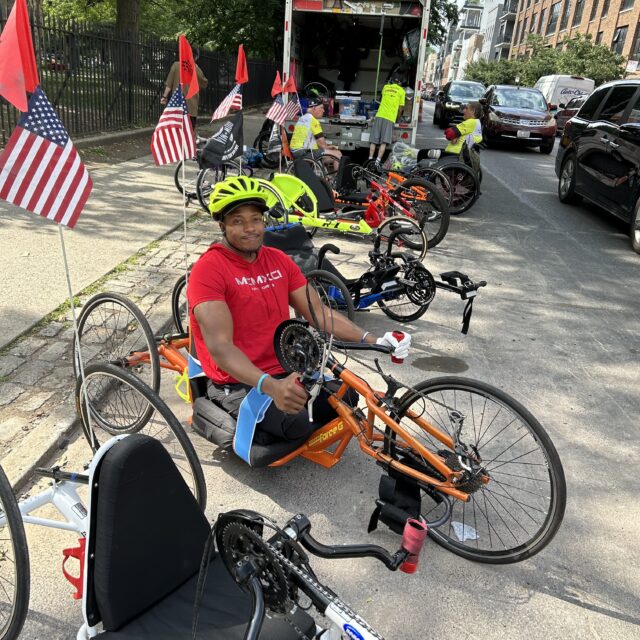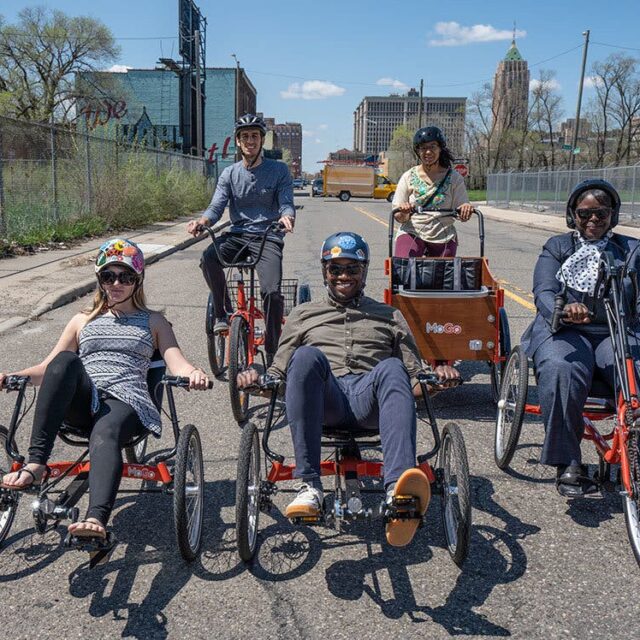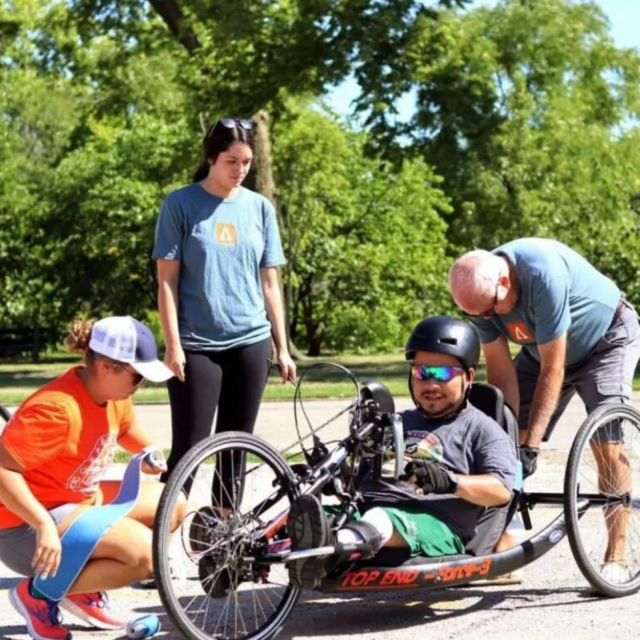A Take On Adaptive Bike Share, Part 3: Portland, OR
by Kiran Herbert, Communications Manager
October 11, 2023
In operation since 2017, Biketown’s adaptive program was designed with — and has continued to grow as a result of — extensive community input.
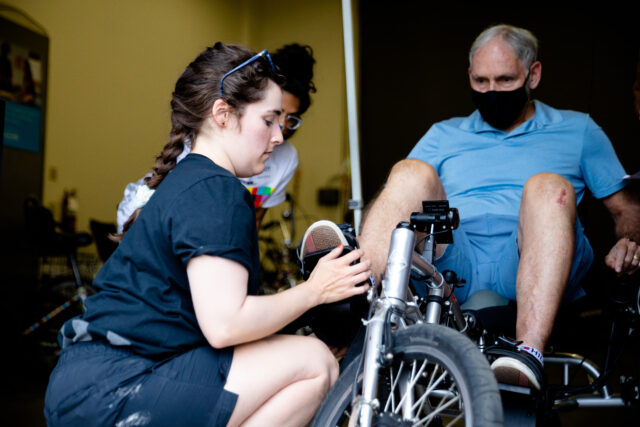
Photo credit: Jordan Beckett Photo
From the outset of bike share in Portland, Oregon, launching an adaptive program has been on the Portland Bureau of Transportation’s (PBOT) radar. The agency, which oversees the Biketown system alongside its operator Lyft, has long been invested in creating a system that serves the needs of everyone. Before launching the Biketown program in July 2016, PBOT staff were conducting station outreach and gathering feedback from residents.
“During that time, we heard from community members asking for access to bike share for people with disabilities, especially physical disabilities that would preclude them from using a conventional two-wheeled bike,” says Steve Hoyt-McBeth, who’s managed the bike share program at PBOT since its inception.
When PBOT received a formal request for an adaptive system shortly after, leadership granted permission, and a small amount of funding, to go forward and explore what a program could look like. As it turned out, there was an adaptive bike clinic that the Portland Parks and Recreation Bureau was hosting that summer, and PBOT attended in order to talk to people and learn more about what they wanted out of a permanent adaptive program.
“What people wanted was very different than what bike share was as an out-of-the-box solution,” says Hoyt-McBeth. “We made the decision — in terms of our community outreach and our program design — that we were going to start with what the community wanted and build a program from there, as opposed to coming to the community with a solution and then trying to see how that solution could fit for the community.”
PBOT organized an adaptive bike community working group that included both service providers and community members that represented people with a wide range of disabilities, from those with quadriplegic injuries to visual impairments to head injuries. Over the course of a year, PBOT collaborated with the working group members to gather input on what the community would like to see in an adaptive biking program. Partner organizations included local disability groups such as Incight, Wheel Connect, and Brain Injury Connections NW, as well as elder advocacy organization Elders in Action, and the Oregon Department of Health Services. The working group also included a few providers that were on the bike side of things, including one provider that actually sold adaptive bikes. PBOT also disseminated an online survey that received about 130 responses.
Throughout that process, PBOT learned the following:
- There is no single “disability community” and learning to see each group as unique was key to moving forward.
- People mostly wanted to ride for recreation, health, and connection, not necessarily for transportation.
- People wanted to ride where they didn’t have to interact with cars.
- People wanted a staffing solution that would be able to assist with bike fittings and transfer between devices (from wheelchair to adaptive bike, for example), as well as device storage while they rode.
- What people wanted was very different from what we traditionally think of as bike share.
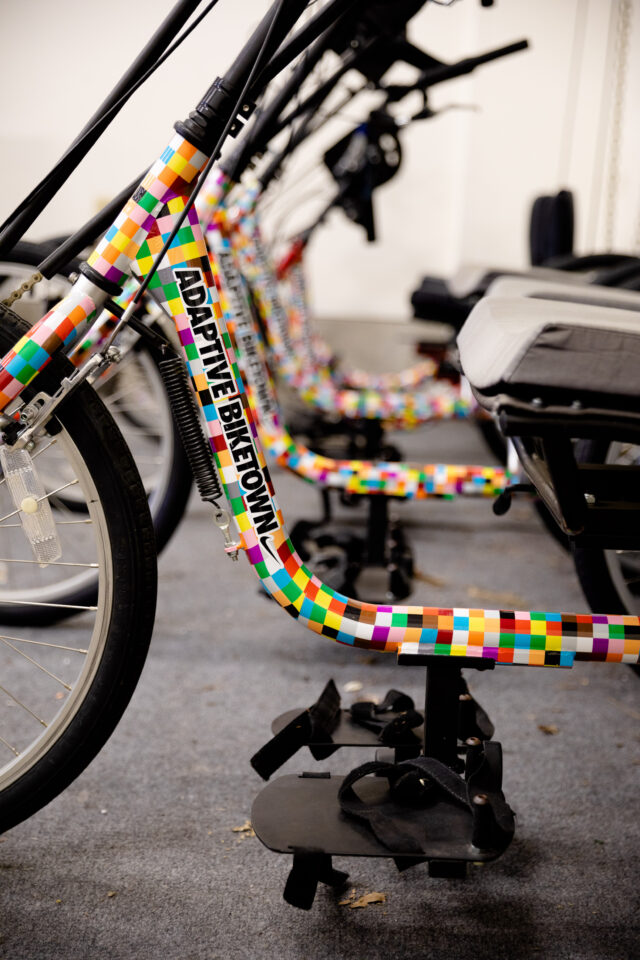
Photo credit: Jordan Beckett Photo
The resulting program, Adaptive Biketown, launched in 2017 as a $30,000 pilot program that operated in partnership with two local bike shops — Kerr Bikes and Different Spokes — offering a variety of adaptive bike models. The program had 59 rentals during the 14-week operation period in 2017. While about 40% of users were those with disabilities, the program was also popular for caregivers and others who simply don’t feel comfortable riding a 2-wheeled bicycle.
In the years since, the program has evolved, growing considerably with subsequent grants from Nike, Biketown’s title sponsor. To date, Kerr Bikes continues to operate as Biketown’s adaptive partner, with a prime car-free location on the city’s Eastbank Esplanade. Today, Adaptive Biketown operates from Thursday through Monday, 11 am to 5 pm during the summer season, with reservations encouraged but walk-ups accepted. From November through March, bikes are available by reservation only.
Adaptive Biketown now includes electric-assist adaptive vehicles, and like the larger Biketown system, no longer charges for hour-long rides for those enrolled in the Biketown For All low-income program (for four-hour rides, the price is $7; for those paying full price, hour-long rentals range from $7-$45/hour depending on the vehicle). For those who aren’t already enrolled in the Biketown for All program, Kerr will help sign up folks on the spot, even if they’re not looking to rent an adaptive vehicle.
“We’ve had between 200 to 300 Biketown for All sign-ups — a pretty large number — at the Kerr location,” says Roshin Kurian, a transportation demand management specialist at PBOT whose work includes all things bike share. “It just shows not only the need for having a physical location for people to sign up, but also the need for hands-on support.”
Additionally, there’s now a tighter linkage between Adaptive Biketown and two-wheeled Biketown thanks to a bike share station having been added to the Kerr hub. The ability for family members or friends to join adaptive riders has helped create a beautiful synergy between the two programs. In 2022, Adaptive Biketown experienced its highest annual ridership to date with 245 rides. This year, it’s already surpassed that number, with 391 rides taken as of September.
Much of the program’s success continues to be due to the close connection it maintains with the larger adaptive community in the region. In the last few years, PBOT has conducted surveys and kept in touch with its target population through newsletters, working to understand how it has been working for people with disabilities and how things could be improved. In March 2022, PBOT convened another working group, learning from those who had already engaged with Adaptive Biketown and those who hadn’t but wanted to be more involved.
“There was a lot of really positive feedback on how the program is going but we also learned more about some of the barriers,” says Kurian, noting that they included things like cost, awareness about the program, and the need for more bikes for smaller statured folks and children.
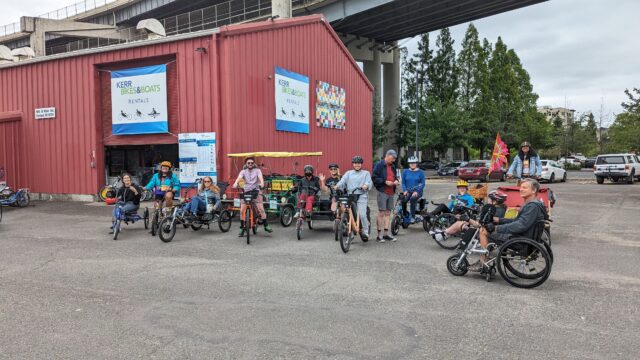
A photo from Adaptive Biketown’s “Ride With a Buddy” series. (Photo credit: Portland Bureau of Transportation)
PBOT staff assumed that the focus group would highlight the need for a second adaptive hub but instead, most of the feedback was about the need to see the program as it is connected to more riders. The bottom line: Do a better job of publicizing the existing hub, with its protected infrastructure on flat ground right next to the river.
“We learned we’re doing good but we’re not reaching everyone,” says Kurian, noting that, unlike traditional bike share, adaptive programs are more incumbent upon the service provider marketing them. “The question became, how do we reach more people? And how do we help remove the barrier around riding with somebody or getting comfortable riding an adaptive bike?”
Based on that feedback, PBOT is leaning into more adaptive group rides to help cultivate community. The organization has launched a “Ride With a Buddy” series and has also been leaning into partnerships with organizations such as Parkinson’s Resources of Oregon and the National Multiple Sclerosis Society, and The Street Trust. Adaptive Biketown has also been more involved with the Portland Sunday Parkways series, which shuts down city streets to cars so that people of all ages and abilities can bike, walk, roll, or play. For one event, Adaptive Biketown showed up with its bikes, as did two other adaptive providers, creating one giant adaptive fleet that could enjoy the streets together.
“That was a really sweet moment, a sort of physical manifestation of why we do this work,” says Kurian, adding that there’s always more to be done. “We still have our charge from the working group to connect to more community groups, so we’ll continue to do that — community engagement work never ends.”
This article is part of a series — tune back in to learn about more adaptive bike programs in cities across the country. Have a question or a story idea? Email kiran@peopleforbikes.org.

